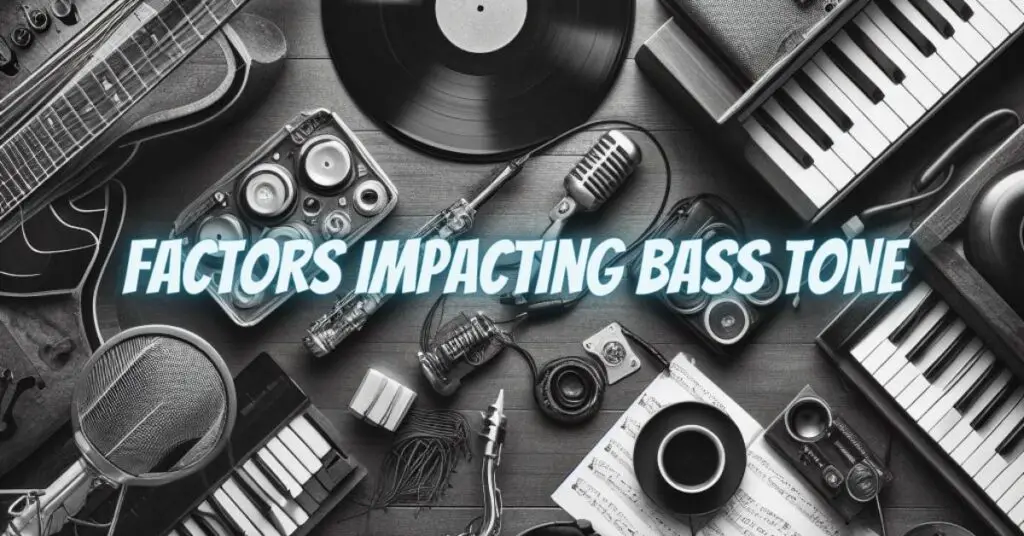The rich, resonant sound of a bass guitar forms the foundation of countless music genres, from rock and jazz to funk and reggae. Understanding the elements that influence bass tone is essential for any bassist looking to craft their desired sound. In this article, we’ll explore the key factors that affect bass tone, providing insights into how each element contributes to the overall sonic experience.
- Type of Bass Guitar
The choice of bass guitar itself has a profound impact on its tone. There are several types of basses, including the Precision Bass (P-Bass), Jazz Bass (J-Bass), and various models by different manufacturers, each with unique tonal characteristics. For instance, a P-Bass is known for its deep, thumping sound, while a J-Bass offers a brighter, more articulate tone. The materials used in the construction of the bass, such as the wood and hardware, also play a role in shaping its tonal profile.
- Strings
The type and gauge of bass guitar strings significantly influence the tone. Roundwound strings produce a bright, articulate sound, while flatwound strings offer a smoother, more mellow tone. The thickness or gauge of the strings can affect the tension and overall resonance of the instrument. Experimenting with different string types and gauges can help you achieve your preferred bass tone.
- Pickups
Pickups are the heart of a bass guitar’s tone. There are two primary types of pickups: single-coil and humbucker. Single-coil pickups provide a crisp and clear sound, while humbuckers offer a warmer and thicker tone. The positioning of the pickups relative to the strings also affects the tone, with bridge pickups emphasizing treble frequencies and neck pickups emphasizing bass frequencies.
- Playing Technique
Your playing technique and style have a profound influence on the tone you produce. Factors such as fingerstyle, slap bass, palm muting, and fretting hand position all impact the sound. Different techniques can bring out various tonal nuances, so practicing and experimenting with your playing style is essential for achieving the desired bass tone.
- Amplification and Effects
The amplification system you use has a significant impact on your bass tone. Bass amplifiers come in various sizes and configurations, each affecting the overall sound. The choice of amplifier settings, such as EQ (equalization), gain, and volume, allows you to shape the bass tone to your liking. Additionally, effects pedals like distortion, chorus, and compression can further shape and color your sound.
- Playing Environment
The acoustics of the room or playing environment also play a role in how your bass tone is perceived. The size, shape, and materials of the room can affect the resonance and projection of the bass sound. When recording or performing live, consider the acoustics and adjust your setup accordingly to achieve the desired tonal balance.
- String Action and Setup
The setup of your bass guitar, including string action (the height of the strings above the fretboard) and neck relief, impacts how easily the instrument can be played and how well it stays in tune. Proper setup ensures optimal playability and can influence the overall tone, as lower action might yield a brighter sound, while higher action can produce a mellower tone.
- Choice of Amplification Cabinet
The type and quality of the speaker cabinet you use can significantly affect the bass tone. Different speaker configurations and sizes produce unique sonic qualities. Experimenting with various speaker cabinets can help you find the ideal complement to your bass and playing style.
The bass guitar is a versatile instrument, offering a wide range of tonal possibilities. Understanding the various factors that affect bass tone is crucial for any bassist looking to shape their sound. By considering the type of bass, strings, pickups, playing technique, amplification, and other elements, you can fine-tune your bass tone to match your musical preferences and create a distinctive sonic identity. Ultimately, the journey to find your perfect bass tone is a rewarding one, filled with experimentation and discovery.


